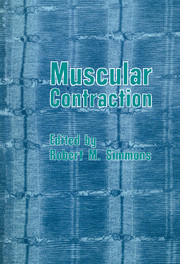Book contents
- Frontmatter
- Contents
- Dedication
- Contributors
- Preface
- 1 A. F. Huxley: an essay on his personality and his work on nerve physiology
- 2 A. F. Huxley's research on muscle
- 3 Ultraslow, slow, intermediate, and fast inactivation of human sodium channels
- 4 The structure of the triad: local stimulation experiments then and now
- 5 The calcium-induced calcium release mechanism in skeletal muscle and its modification by drugs
- 6 Hypodynamic tension changes in the frog heart
- 7 Regulation of contractile proteins in heart muscle
- 8 Differential activation of myofibrils during fatigue in twitch skeletal muscle fibres of the frog
- 9 High-speed digital imaging microscopy of isolated muscle cells
- 10 Inotropic mechanism of myocardium
- 11 Regulation of muscle contraction: dual role of calcium and cross-bridges.
- 12 Fibre types in Xenopus muscle and their functional properties.
- 13 An electron microscopist's role in experiments on isolated muscle fibres.
- 14 Structural changes accompanying mechanical events in muscle contraction.
- 15 Mechano-chemistry of negatively strained cross-bridges in skeletal muscle.
- 16 Force response in steady lengthening of active single muscle fibres.
- References
- Index
1 - A. F. Huxley: an essay on his personality and his work on nerve physiology
Published online by Cambridge University Press: 07 September 2010
- Frontmatter
- Contents
- Dedication
- Contributors
- Preface
- 1 A. F. Huxley: an essay on his personality and his work on nerve physiology
- 2 A. F. Huxley's research on muscle
- 3 Ultraslow, slow, intermediate, and fast inactivation of human sodium channels
- 4 The structure of the triad: local stimulation experiments then and now
- 5 The calcium-induced calcium release mechanism in skeletal muscle and its modification by drugs
- 6 Hypodynamic tension changes in the frog heart
- 7 Regulation of contractile proteins in heart muscle
- 8 Differential activation of myofibrils during fatigue in twitch skeletal muscle fibres of the frog
- 9 High-speed digital imaging microscopy of isolated muscle cells
- 10 Inotropic mechanism of myocardium
- 11 Regulation of muscle contraction: dual role of calcium and cross-bridges.
- 12 Fibre types in Xenopus muscle and their functional properties.
- 13 An electron microscopist's role in experiments on isolated muscle fibres.
- 14 Structural changes accompanying mechanical events in muscle contraction.
- 15 Mechano-chemistry of negatively strained cross-bridges in skeletal muscle.
- 16 Force response in steady lengthening of active single muscle fibres.
- References
- Index
Summary
This article was originally written in 1970 for an Italian editor who intended to publish a book about the Nobel Prize winners for Physiology and Medicine (which has never been published). Having had the privilege of collaborating with Andrew Huxley for most of the period of his work with Alan Hodgkin which finally was awarded the Nobel Prize, a colleague thought that I probably had a very personal experience of this historical event and might be the right author to describe this period. In doing so, this chapter gives my personal impressions of the personality of Andrew Huxley during the early part of his and my own scientific career. It also provides an account of his contribution to research in nerve physiology which preceded his very successful work in muscle physiology and biophysics which is the main subject of this book.
Parentage and life before World War II
Andrew Fielding Huxley was born in Hampstead, London, on November 22, 1917. His father Leonard Huxley was a son of the famous nineteenth-century biologist, educator, and writer Thomas H. Huxley who, in his book Man's Place in Nature, first popularised the view that human beings evolved from other animals.
Andrew Huxley wrote in his curriculum vitae:
My father Leonard Huxley was for a time a classics master at Charterhouse School and later took up a literary career, writing a number of biographies and being the editor of the Cornhill magazine. The children of his first marriage included Sir Julian Huxley, the biologist, and Aldous Huxley, the writer. After his first wife's death, my father married Rosalind Bruce, and I am the younger of the two sons of this marriage. My father died in 1933.
- Type
- Chapter
- Information
- Muscular Contraction , pp. 1 - 18Publisher: Cambridge University PressPrint publication year: 1992

